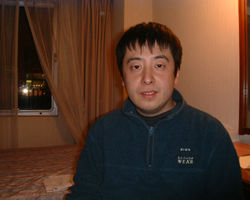|
Platform Jia Zhang-ke (Director) |
 Jia Zhang-ke came to international attention early on with his first feature Xiao Wu (1997). Platform, his second feature, clocks in at an epic over three hours, which puts it in sharp contrast to the delicate intensity of his previous work. That said, it's hardly likely that anyone will find the film long. From start to finish, a succession of shots colored with the sparkle of unmistakable true genius verging almost on madness appear one after the other before the audience's eyes. The film feels anything but long; rather, what this reporter ultimately felt was the explosive force of a director who has tried to tell the entire story that lies inside him in one fell swoop.
Jia Zhang-ke came to international attention early on with his first feature Xiao Wu (1997). Platform, his second feature, clocks in at an epic over three hours, which puts it in sharp contrast to the delicate intensity of his previous work. That said, it's hardly likely that anyone will find the film long. From start to finish, a succession of shots colored with the sparkle of unmistakable true genius verging almost on madness appear one after the other before the audience's eyes. The film feels anything but long; rather, what this reporter ultimately felt was the explosive force of a director who has tried to tell the entire story that lies inside him in one fell swoop.Set in the era from 1979 to 1989, the film brings together dramatically changing images of China through portrayals of the members of a travelling performance group. "I had reasons for choosing an era like this. First of all, China experienced very violent social and economic changes in this era. The Cultural Revolution had finished, and the waves of change to a market economy were washing in. It was also the era when I was. Nonetheless, Kim chose professional wrestling as his subject because he saw it as a vehicle through which he could express what he wants to talk about now. "I was watching professional wrestling, and I thought 'This is society today. This is society miniaturized.' To me, people today are all controlled by something that has been preordained by someone outside. Society today sometimes looks like a show put on by that kind of people. These feelings were the deciding factor in making the film, and are reflected in the film by the way that the main character is an ordinary bank clerk." The bank clerk turned "Foul King" who makes audiences roar with laughter is played by Song Kang-ho, a regular in Kim's films since he appeared in The Quiet Family. The role fits him so well, it's as if the film was made for him. "To be honest, when I was writing the script, I didn't mean to cast him again. I mean, I couldn't imagine him as an "ordinary bank clerk" at all," laughed the director. "But I was writing the script with no one in particular in mind, I kept getting calls from him. Nothing important, just 'How's it going?' And by the time I finished writing, for some reason or other he'd become the perfect person for the part," he continued with another laugh. So in the end, it was clear that the film couldn't be made without him." With it's intriguing combination of extreme close-ups and long shots and its distinctive timing, The Foul King seems as if it must have been shot from a storyboard calculated out to the finest detail, but apparently Kim works the exact opposite way. Kim's reunion with Song, an actor who understands him well, worked to good effect here too. "I don't draw any storyboards, and I barely ever rehearse scenes. I want to place complete trust in the actors' natural breathing and acting right there on the spot. That's how I work. So it's imperative that the actors understand my films. The way I see it, actors understand the film 100% from the moment I give them the script. I don't give them any other direction on the set. Nagisa Oshima once said, "The actors speak the lines that I've thought up. What more can a director want?' When I heard this, I was moved, and thought it represented my thoughts exactly." For director Kim, who sees contemporary society as a show put on people manipulated by something else, the film set might just be one paradise where he is free from the pro-wrestling we know as the world today. Sozo Teruoka Film Critic
Director's Profile: Born in 1970 in Shanxi, China. Entered the Beijing Film Academy in 1993. In 1995, founded and independent film production group and directed the 55-minute video Xiao Shan Going Home, which won the Gold Prize at the Hong Kong Independent Film Awards. Full-length 16 mm graduation work Xiao Wu (1997) premiered at the Berlin Film Festival in 1998, where it ran away with the Wolfgang Staudte Award for Best New Director, and has also taken the Grand Prize at three other film festivals. |